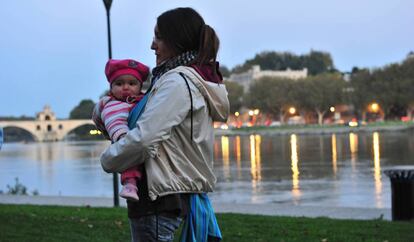“My son has gotten to know his grandparents through Skype”
The number of Spaniards living abroad has risen for the eighth year in a row
The number of Spaniards born in Spain but now living abroad has grown for the eighth year in a row. The amount of people listed in 2017 on PERE, a register of Spaniards with foreign residence, is 794,209; last year, that figure was 766,996, according to data released on Wednesday by the National Statistics Institute (INE).

But in reality, the figure could be higher, as the register only reflects the status of people who register at Spanish embassies and consulates around the world. An association called Marea Granate, made up of Spanish expats, claims that “this figure is inaccurate, because not all [Spanish expats] sign up.”
Taking into account individuals who hold Spanish citizenship but were not born in Spain, the number of Spaniards living abroad rises to 2,406,611, a 4.4% increase from 2016.
The decision to leave was not taken to broaden our minds, but to stop being a burden on our families
Marea Granate
Specific figures tracking Spaniards who move abroad were first released in 2009, soon after the economic crisis hit. That year, the number of registered Spanish expats was 633,750.
“Going abroad is an enriching experience,” said Spain’s foreign minister, Alfonso Dastis, during a congressional address last December.
Arantxa Alba, a 32-year-old from Madrid who has been living in the German city of Dusseldorf since 2012, believes that this is mostly true when you go abroad out of choice, not out of necessity.
This economics graduate and her partner, an engineer, moved to Germany in search of better jobs. She now works at Essen University, where she is doing research work on the economics of health.
“I didn’t have a lot of research experience but they gave me a chance, and besides, I can have a family here. In Spain, it would be unthinkable,” she says.
Employment figures for Spain, which has the second-highest jobless rate in the European Union, show that there are 4.2 million people out of work in a country with a population of 46 million. Last year ended with job creation, but most of those positions were precarious.

Arantxa Alba had a baby in August of last year, and she admits that ever since then she has felt like coming home more than ever before.
“In Germany we have the jobs that we like, but that is all,” she notes. “If we stay, my son will have a father and a mother, but in Spain he would have an entire family with grandparents, uncles and aunts.”
Returning to Spain, however, “means giving up on professional dreams.”
Online video apps such as Skype have helped keep in touch with the family back home. “My mother knows her grandson more through the computer screen than in person,” says Arantxa.
The story will sound familiar to Rocío Veneros, a 33-year-old from Madrid who moved to the French city of Avignon in August 2011. She says that her four-year-old daughter has been on Skype ever since she was a baby.
In Spain, you can just barely get by
Rocío Veneros
Veneros admits that, while she has settled down in her new home, it is “not where I want to be.” Every time she goes back to Spain on holidays, her daughter asks why they cannot stay.
“In France it’s just her and me, nobody else. In Spain she feels the warmth and loving care of the entire family.”
It began in September 2010, when the school she had been working at as a social integrator, in the Madrid district of Vallecas, did not renew her contract. She started working at supermarkets, but felt “very frustrated.” In May 2011, the “Indignados” popular protest movement that swept Spain gave her new hopes.
“The crisis was hitting hard. A lot of people were sick and tired of precarious jobs,” she recalls.
A few months later, she and two friends went to France for the grape harvest. It was going to be a one-month adventure, but she stayed on as a house cleaner, then managed to land a job as a school activity coordinator.

She was offered a job in Spain last Christmas, but the wages were too low. “I am doing well here, although I am alone,” she says. “In Spain, you can just barely get by. I am not in that situation in France. The state makes things easier.”
There are Spaniards who have no plans of ever coming back. Pablo Torija, 35, packed his bags in 2007 to take a master’s degree in economics in Denmark. “Back then they were very expensive in Spain, and it was free over there,” he says.
After graduation, he tried returning to Madrid for a PhD, but “what they were paying was ridiculous.” Now he is living in Vienna with his partner, an Austrian woman, and they have two children ages five and two.
The Marea Granate association considers that the foreign minister’s words in Congress were an attempt to “understate the dramatic situation of thousands of youngsters who are going abroad because of the lack of jobs.”
“Ever since the crisis began in 2008, the vast majority of those who left our country did so simply because we had no choice,” reads a release posted by the group in reply to Dastis’ statements. “So don’t call it ‘initiative,’ call it ‘need.’ And don’t call it ‘interest,’ call it ‘despair.’ Mr Minister, don’t call it ‘broadmindedness’ because the decision to leave was not taken to broaden our minds, but to stop being a burden on our families, to help them out financially, and above all, to seek out a dignified life.”
English version by Susana Urra.
Tu suscripción se está usando en otro dispositivo
¿Quieres añadir otro usuario a tu suscripción?
Si continúas leyendo en este dispositivo, no se podrá leer en el otro.
FlechaTu suscripción se está usando en otro dispositivo y solo puedes acceder a EL PAÍS desde un dispositivo a la vez.
Si quieres compartir tu cuenta, cambia tu suscripción a la modalidad Premium, así podrás añadir otro usuario. Cada uno accederá con su propia cuenta de email, lo que os permitirá personalizar vuestra experiencia en EL PAÍS.
¿Tienes una suscripción de empresa? Accede aquí para contratar más cuentas.
En el caso de no saber quién está usando tu cuenta, te recomendamos cambiar tu contraseña aquí.
Si decides continuar compartiendo tu cuenta, este mensaje se mostrará en tu dispositivo y en el de la otra persona que está usando tu cuenta de forma indefinida, afectando a tu experiencia de lectura. Puedes consultar aquí los términos y condiciones de la suscripción digital.








































